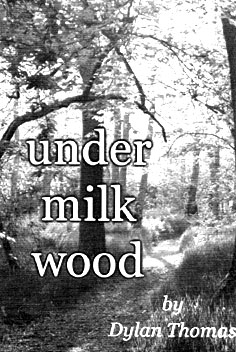| |
Thomas and Ives: It’s All in
the Words, W-o-r-d-s, Words.
at the Burton Taylor from 23rd November

If you have an ear for the nuances and rich textures of language,
then this ‘double bill’ of plays is for you! The Burton
Taylor Theatre are bringing to life Dylan Thomas’s Under Milk
Wood and David Ives’s much neglected All in the Timing. Those
who think of Thomas as primarily a drunkard and secondly a poet will
be proved mistaken. Whilst glimpses of a drunkard’s perspective
decorate the opening scenes of UMW, this is only a glaze to his luxurious
palette. The dream scene adds a surreal depth to the make-believe
Welsh village of Llareggub (buggerall); not least because it ambles
through the reflective memories of drowned and sleeping souls.
Through this dream-confusion of character identities (the actors play
about five each), the homogenous nature of village life is revealed.
Once you get used to the variations on the Welsh accent, the characters
merge and emerge through their differing experiences. Interstices
of humour, irony and pathos, revealed in rich rounds of descriptive
or spoken language, breathe life into this jumbled community. The
second scene brings a ‘morning’ air of uneasy remembrance,
as the drunk confronts the inconclusive pointlessness of his night’s
unbridled activities. Women gossip and the village resumes a normalcy
that is nevertheless overshadowed by drifts of life-death imagery.
It is far from sombre, though; There’s the woman who complains
of her nightly ’school-girl’ beating, or the revelation
of the drunkard’s pathetic pranks. But comedy mostly seeps in
through the words; the ironic, accepting chuckle of a weary, inebriated
man who finds beauty in pathos.
UMW is succeeded by a collection of four (of five) short sketches
by American author/playwright, David Ives. This continues the ’language’
theme, pointedly entitled All in the Timing. These pieces are witty,
and short enough to be appreciated without boredom; anyone familiar
with modernist works like Eliot’s Sweeney Agonistes (1932) will
recognise the genre of conscious word patterning that reduces ‘content’
to a minimum, whilst giving words centre-stage as sound-combinations.
But dull it is NOT!!
The pace, for a start, gives no opportunity to twiddle one’s
thumbs. An ostensibly two-line sketch of a man - Philip Glass - who
spots his ex-lover whilst buying a loaf of bread becomes a full concerto.
Words fragment into nonsense, poetry and song, so focussing on the
poor chap’s (and girl’s, shop-keeper’s and friend’s)
confusion at the sighting. Repetition stalls time, reeling out the
momentary dilemma in comic discomfort until the words are gathered
together, finally, into a coherent reiteration of the emotional sighting.
It might have been tedious but humour, they say, is all in the timing,
and these guys are clearly practised. However, sketch two, Universal
Language allowed comedy to dominate form. Even here though, things
wound up just when I began to get fidgety. A con man persuades a shy,
stuttering secretary to pay for lessons in a nonsense language, Unamunda.
Its strange mix of English (‘John Cleese’), Italian and
gibberish is surprisingly easy to pick up; even from a man who professes
to know only three English words: ‘Hello’, ‘Goodbye’
and ‘Rice Krispies’; (oh, and ‘That’ll be 500
pounds!’). The two certainly form a convincing duet (revealing
its operatic origins) in this ‘universal’ lingo.
I left content and inspired. Anyone wanting to see these should try
to make both! They are short enough, entertaining enough, and fit
together amazingly well.
|